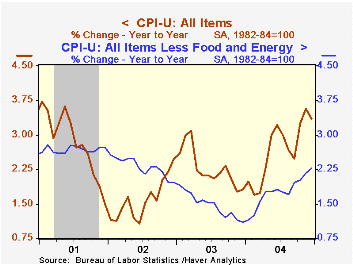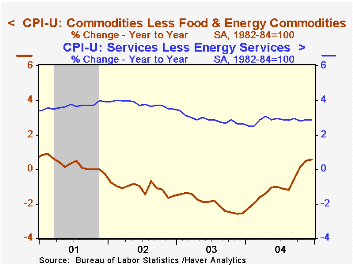 Global| Jan 19 2005
Global| Jan 19 2005December CPI Fell. 2004 Average Raised by Less Goods Price Deflation
by:Tom Moeller
|in:Economy in Brief
Summary
Consumer Prices (CPI-U) declined 0.1% in December, the first decline since July. Consensus expectations had been for no change. During 2004 prices logged the largest increase in some time. December to December, the 3.4% gain was the [...]

Consumer Prices (CPI-U) declined 0.1% in December, the first decline since July. Consensus expectations had been for no change. During 2004 prices logged the largest increase in some time. December to December, the 3.4% gain was the strongest since 2000 and the 2.7% rise for the whole year was the largest since 2001.
Prices less food & energy rose an expected 0.2% in December for the third consecutive month. Again, 2004 was the strongest year for "core" pricing in years; the 2.3% gain December to December the largest since 2001 and the 2.7% gain for the full year was the strongest since 1996. The firming was, however, not due to stronger price increases but to less deflation of goods prices.
"Core" commodities price inflation weakened in December as lower prices for furniture (-0.5% y/y), apparel (-0.4% y/y) and computers (-13.2% y/y) offset higher tobacco prices. The 0.9% full year decline in core goods prices was the third in a row but it was less of a fall than during the prior two years.
Services prices less energy also were tame last month, rising the same 0.2% as during the prior two. The full year increase of 2.8% was the weakest since 1999 as lower public transportation prices and lower communication prices offset faster gains in prices for shelter (2.7% y/y), medical care services (5.0% y/y) and tuition (7.1% y/y).
Lower energy prices pulled the CPI down last month, led lower by gasoline prices which fell 3.7% (+18.1% y/y) and lower fuel oil prices ((+15.5% y/y). Natural gas prices rose slightly (+3.8% y/y).
Food prices were unchanged in December but the full year gain of 3.5% was the strongest since 1990.
The chained CPI, which adjusts for shifts in the mix of consumer purchases, fell 0.4% in December. Similar to the PCE price deflator, core chain prices also fell last month and for the full year firmed moderately versus 2003.
| Consumer Price Index | Dec | Nov | Y/Y | 2004 | 2003 | 2002 |
|---|---|---|---|---|---|---|
| Total | -0.1% | 0.2% | 3.4% | 2.7% | 2.3% | 1.6% |
| Total less Food & Energy | 0.2% | 0.2% | 2.3% | 1.8% | 1.5% | 2.3% |
| Goods less Food & Energy | -0.1% | 0.1% | 0.6% | -0.9% | -2.0% | -1.1% |
| Services less Energy | 0.2% | 0.2% | 2.9% | 2.8% | 2.9% | 3.8% |
| Energy | -1.8% | 0.2% | 16.5% | 10.9% | 12.2% | -5.8% |
| Food | 0.0% | 0.2% | 2.7% | 3.5% | 2.1% | 1.8% |
| Chained CPI: Total (NSA) | -0.4% | 0.0% | 2.9% | 2.2% | 1.9% | 1.3% |
| Total less Food & Energy | -0.3% | 0.0% | 1.9% | 1.4% | 1.1% | 1.9% |
Tom Moeller
AuthorMore in Author Profile »Prior to joining Haver Analytics in 2000, Mr. Moeller worked as the Economist at Chancellor Capital Management from 1985 to 1999. There, he developed comprehensive economic forecasts and interpreted economic data for equity and fixed income portfolio managers. Also at Chancellor, Mr. Moeller worked as an equity analyst and was responsible for researching and rating companies in the economically sensitive automobile and housing industries for investment in Chancellor’s equity portfolio. Prior to joining Chancellor, Mr. Moeller was an Economist at Citibank from 1979 to 1984. He also analyzed pricing behavior in the metals industry for the Council on Wage and Price Stability in Washington, D.C. In 1999, Mr. Moeller received the award for most accurate forecast from the Forecasters' Club of New York. From 1990 to 1992 he was President of the New York Association for Business Economists. Mr. Moeller earned an M.B.A. in Finance from Fordham University, where he graduated in 1987. He holds a Bachelor of Arts in Economics from George Washington University.
More Economy in Brief
 Global| Feb 05 2026
Global| Feb 05 2026Charts of the Week: Balanced Policy, Resilient Data and AI Narratives
by:Andrew Cates






